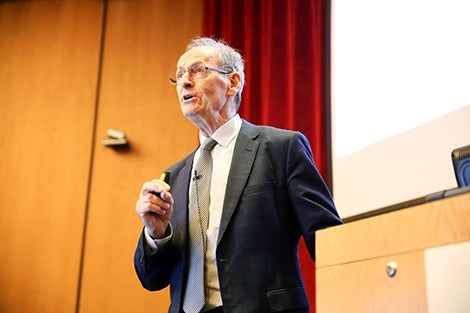May 16, 2019—Something is very wrong in the United States and the United Kingdom, renowned epidemiologist Sir Michael Marmot told a standing room-only audience at Harvard T.H. Chan School of Public Health. While the rich continue to enjoy good health and longer lives, he said, the poor are getting sicker and dying younger.
In Baltimore, Md., for example, there is as much as a 20-year difference in life expectancy between men living in a poor neighborhood and men in a well-off neighborhood.
“This is a calamity,” Marmot said. “How can you improve health for a whole population when you’ve got this inequality?”

Marmot, director of the Institute of Health Equity in the Department of Epidemiology and Public Health, University College London, delivered the 169th Cutter Lecture on Preventative Medicine in Kresge G-1 on May 10. First held in 1912, the lectures are administered by the Department of Epidemiology. Watch video of the event.
Known for his work linking socioeconomic position to health outcomes, Marmot is the author of The Health Gap: The Challenge of an Unequal World. He has advised the World Health Organization, national governments, and local governments in the U.K. on mitigating health inequities.
He called for “evidence-based policy presented in the spirit of social justice,” noting that this can include living wages, and social spending in areas such as housing and early childhood development.

Marmot said that it is the social conditions surrounding poverty that cause health inequities. For example, stressful experiences in childhood such as exposure to violence on the street can lead to mental illness, risky behaviors, and a lifetime of poor health outcomes. He said that one of the ways that the root causes of health inequities could be addressed would be to reduce childhood poverty. The U.S. and U.K. have the financial capability to do so Marmot said—adding that not doing it is a political decision.
Another argument for social justice-informed policies, Marmot noted, is that social mobility is far less likely in the U.S. than most Americans would like to believe. Few of those born to fathers with incomes in the lowest 25% will join the top 25% of earners. Whereas in Denmark, he said, a person’s paternal income seems to have little influence on their likelihood of making it into the top income quartile.
Declining life expectancy among the poor in the U.S. and U.K. shows that “Social injustice is killing people on a grand scale,” Marmot said. What’s needed, he said is a policy approach that empowers people to live dignified lives of purpose and meaning.
Photos: Chenli Ye
